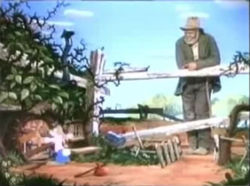One progressive effort to wipe out racism today is to insist it's still omnipresent now but eliminate it from the past. So authors like Mark Twain, or even Ian Fleming, are shoved to the side if they examined the culture of their day uncritically. In the case of Mark Twain, even a black character who is clearly a hero has to be censored.
So it goes in film media as well. There is a Disney film you can't buy in the United States, but you can buy in England, because it is racist in the United States. Yet the English brought slaves to America, Thomas Jefferson instead made importation of slaves illegal in 1808. And they don't think it is racist.
Writing in Index on Censorship, film historian Kunle Olulode argues that, however uncomfortable, sensitive topics should not be edited out.

"Song of the South". Credit: disney.wikia.com
"There is a growing modern-day presumption that by airbrushing out racist words and stereotypes of the past we are, in some way, making improvements to the way equalities will be shaped in the here and now. This view has created a new industry geared to suppress edit and, in some cases, revise certain books and films that are discordant with modern life," explains Olulode, who is part of the BFI's African Odyssey programming team.
Arguing that today's restrictions are put forward as progressive tools for equality, Olulode asks us to question whether we "should not accept that films and TV programs of the past will include some stereotypical images of minorities?"
Using Leni Riefenstahls's 1935 Nazi film "Triumph of the Will" as an example, Oluode explains how we must continue to watch and discuss it even though we know it's a Nazi propaganda film to question why we are not open to seeing and talking about racist TV programming in the same way, and the context of its time:
"It's not about making excuses or leaving our critical faculties behind, it is about understanding why something was made, how it was made and how audiences responded to it. This is surely better than attempting to re-edit the past and is it not better also to be able to see how our society's thinking has developed over time."
Olulode concludes that the problem is not the film or the TV program itself, but our pre-disposition to react to something from a modern-day perspective and not by understanding it from the perspective of the culture that produced it:
"Racist culture will have produced racist works of art, and by the same token, racist entertainment and literature [...] Learning to live with and understand this conundrum is part of modern life."
Index on Censorship magazine editor Rachael Jolley said: "This move to edit out the parts of history we disapprove of appears to be growing in the past six months. If we do not understand our history, how can we learn from it?"





Comments